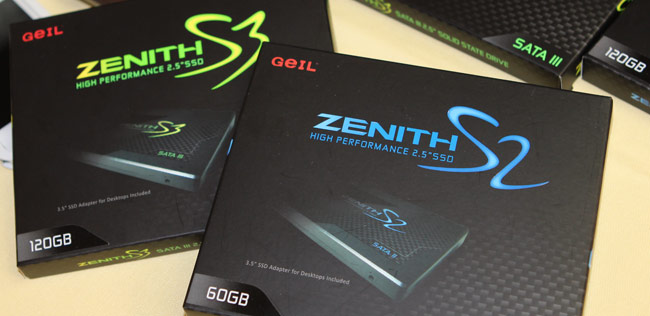Geil, well known for their high performance memory products, has announced the release of their Zenith S2 and S3 SSDs.
The S2 will be a SATA 2 based drive and will offer up to 280MB/s and 270MB/s read and write speeds. The S3 will have a SATA 3 interface and will deliver transfer rates of well over 500MB/s,
The S2 will be available in capacities of 60 and 120GB while the S3 will be available in 60GB, 120GB, 240GB, and 480GB variants.
Geil has stated that the S3 will utilize “GOLDEN firmware”, no doubt referring to the fact that their product will have 60,000 4k IOPS performance. Geil hasn’t yet announced pricing or availability, but there seems to be a general consensus that these products will be released at CeBIT in March, so those interested should be able to get their hands on one soon.
What makes this announcement so unique is the fact that it’s the first LSI Sandforce drive unveiling to come after the release Intel’s 520 SSD, which has been taking the storage world by storm lately. Being that many potential buyers consider the 520 to be one of the only LSI Sandforce based SSDs worth their consideration at this point, it seems that Geil may have something of an uphill battle ahead of itself.
Certainly, it appears that Geil is really going to have to be quite aggressive with this product release, especially when it comes to things like pricing and added value. Indeed, it seems that the days of it being enough to simply market your product as LSI Sandforce based have finally come to a close. The reality is that in the course of a week, a new precedent has been set, and as such, consumers are simply going to expect more out of not just LSI Sandforce SSDs, but all solid state drives going forward.
Whether that “more” comes in the form of lower prices, bundled software/hardware, or longer warranties (I’m sure consumers would appreciate all three), drive manufacturer’s are really going to have to step-up their game order to sway potential buyers, who have likely become more jaded than ever when it comes to solid state storage.
With any luck, ssd companies will view the situation in a similar light, and respond accordingly. It may be only consumers that gain anything from this state of affairs, with catering replacing marketing in an industry that may wind up more focused on the desires of end-users from now on. While firms probably won’t be happy about the prospect having to do hand stands to win over new customers, I, on the other hand, am ecstatic. This game just got more interesting.
 The SSD Review The Worlds Dedicated SSD Education and Review Resource |
The SSD Review The Worlds Dedicated SSD Education and Review Resource | 
